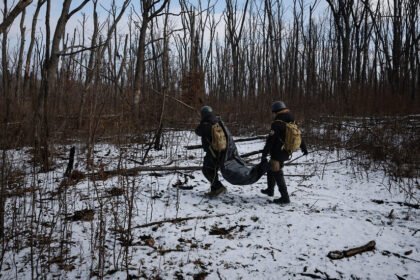Israel pulled its troops from the cities and villages in southern Lebanon on Tuesday, according to the United Nations, but retained strategic positions along the border while a deadline has passed for Israel and Hezbollah to withdraw fully from the south.
The Israeli presence underway on Lebanese territory has risked undermining a fragile truce with Hezbollah and raised fears in Lebanon from another prolonged Israeli occupation.
A ceasefire in November ended the deadliest war between the two parties for decades. Israel and Hezbollah, the Lebanese armed group supported by Iran, were then supposed to cede control from southern Lebanon to the Lebanese army at the end of January – a deadline which was then extended until Tuesday.
But Israel announced on Monday that its forces would temporarily remain in five “strategic” points of view just in front of the border of the Lebanese territory until the Lebanese army has fully implemented its end of the agreement, according to a Israeli military spokesperson, Lieutenant Nadav Shoshani. He refused to say how long the Israeli troops would remain there.
Under the ceasefire, Hezbollah must also withdraw from southern Lebanon and the Lebanese army is supposed to deploy there. Israeli officials accused Hezbollah and the Lebanese army of not maintaining their end. The Lebanese army said that it could only fully deploy in the South once the Israeli soldiers withdrew.
A surveillance committee led by the United States supervising the truce praised the deployment of the Lebanese soldiers but has not published data on the extent to which Hezbollah has withdrawn its weapons and combatants.
For months, thousands of displaced Lebanese could not return to areas controlled by Israel in the midst of repeated warnings of the Israeli army to stay away.
The United Nations, which has long maintained a peacekeeping force in southern Lebanon, said on Tuesday that Israel had withdrawn from population centers in the South. But the organization declared that the Israeli presence continues in the country had violated a United Nations resolution which ended the War of Israel-Hezbollah in 2006 and formed the base of the recent ceasefire between the two parts. The resolution, accepted by Israel and Lebanon, also forced Hezbollah to remove its combatants from the South.
The delay was “not what we hoped to happen,” said the UN envoy to Lebanon and the United Nations peacekeeping force in southern Lebanon in a joint statement.
The displaced residents flocked south Tuesday despite the Israeli presence continues, some arriving home to find their towns and villages almost unrecognizable. At least two people were injured by Israeli shots, according to the Lebanon Public Press Agency.
“Our memories are destroyed and our houses,” Yara Awada said on Tuesday, 24, who entered the southern border town of Houla in more than a year.
Most of the district of Ms. Awada is now in ruins, with her family house overturned to the ground. Her grandfather had built the house with her naked hands over 100 years ago, she said.
“This house meant a lot for my family. Ten children grew up in this house with their cousins and their loved ones. Then suddenly, in a few seconds, everything had disappeared, “said Awada. “It hurts our hearts to see our village like this. But we still have hope and we will rebuild our village better than it was. »»
Last month, Israeli forces killed more than two dozen people while trying to enter the southern border cities, according to Lebanese officials. The Israeli army said it had drawn “warning shots to eliminate threats.”
The new Hezbollah chief, Naim Qassem, vehemently opposed Israel to stay in certain parts of southern Lebanon. But in a speech on Sunday, he ceased to threaten to resume attacks.
“Israel must withdraw completely on February 18,” said Qassem. “This is the agreement,” he added. “Everyone knows how an occupation is treated.”
Despite their objections, Hezbollah and the Lebanese government have no real capacity to force Israel to withdraw. Lebanon leaders have sought to reach their Arab neighbors and use the United States in offers to put pressure on Israel.
But the experts say that Hezbollah, weakened by 14 months of conflict with Israel, risks risking resuscitating the short -term conflict.
However, if Israel remains indefinitely within Lebanon, this could strengthen Hezbollah, regional experts said.
“If Israel remains in these five points, it is absolutely a gift for Hezbollah,” said Paul Salem, vice-president of international engagement at the Washington Middle East Institute. “This allows them to say that the occupation cannot be finished by diplomacy, and therefore this Lebanon continues to need armed resistance.”
The new president of Lebanon, Joseph Aoun, is committed to putting all the weapons under the control of the State, a challenge to Hezbollah, which has long exerted an excessive influence on the country. But we don’t know how or if Mr. Aoun can do this.
The Lebanese army warned civilians on Tuesday not to approach the southern cities until the army was deployed there.
The army has accused Israel of adopting a burnt earth policy in recent weeks, including demolition and fire in houses because it has retired from cities and villages. The Israeli army said that “the destruction of buildings was for military purposes”, adding that it was aimed at Hezbollah infrastructure.
Dayana Iwaza,, Patrick Kingsley And Johnatan Reiss Contributed reports.






